Every dog is special, bringing joy, love, and laughter into our lives. But some breeds are more prone to medical challenges, and knowing this can make all the difference. Understanding the most unhealthy dog breeds helps you care for your furry friend with confidence and compassion.
It’s heartbreaking to see a dog struggle with joint issues, breathing difficulties, or heart problems. These health concerns can affect their energy, happiness, and quality of life. By being aware of the risks, you can spot early signs and take action before small problems turn serious.
Caring for a dog isn’t just about love—it’s about attention, awareness, and preventive care. Regular vet visits, a balanced diet, and careful monitoring can make a huge difference.
With the right care, even dogs prone to health challenges can live full, happy, and vibrant lives alongside the people who adore them.
Most Unhealthy Dog Breeds Much Heard Of
1. Siberian Husky

Siberian Huskies are famous for their striking eyes, thick coat, and boundless energy. They are intelligent, playful, and full of spirit. However, some health challenges can affect their well-being if not carefully monitored.
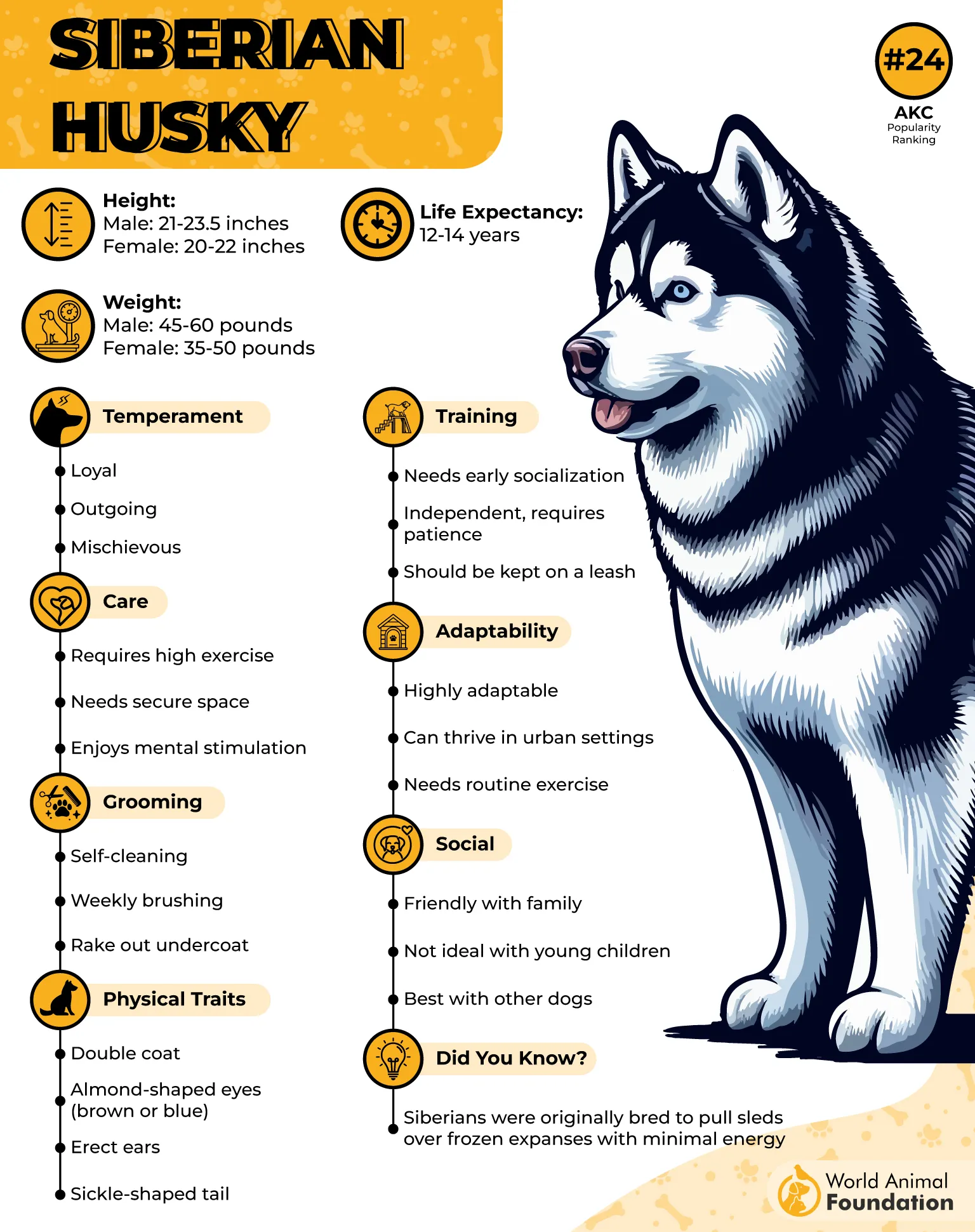
Common Health Problems
Huskies may develop hip dysplasia, causing joint pain and mobility issues, as noted by WebMD. Eye conditions, such as cataracts or corneal dystrophy, can affect vision over time. Some may also experience epilepsy or other hereditary concerns.
Early recognition of symptoms is crucial for maintaining a healthy life.
Tips to Ensure Good Health
Regular Veterinary Check-ups: Detect problems before they worsen.
Balanced Diet: Maintain a healthy weight and overall wellness.
Daily Exercise: Supports joint health and mental stimulation.
Monitor Symptoms: Watch for unusual behavior and consult your vet promptly.
🎧 Dogcast
Episode 10 — Halloween Special
If you don’t hear sound, tap the button above to enable audio.
2. Bulldog

English Bulldogs are beloved for their wrinkled faces and gentle personalities. Despite their charm, their unique body structure—short face, elevated hips, and excessive skin folds—makes them prone to several health challenges.
Being aware of these risks helps owners provide better care and improve the quality of life.
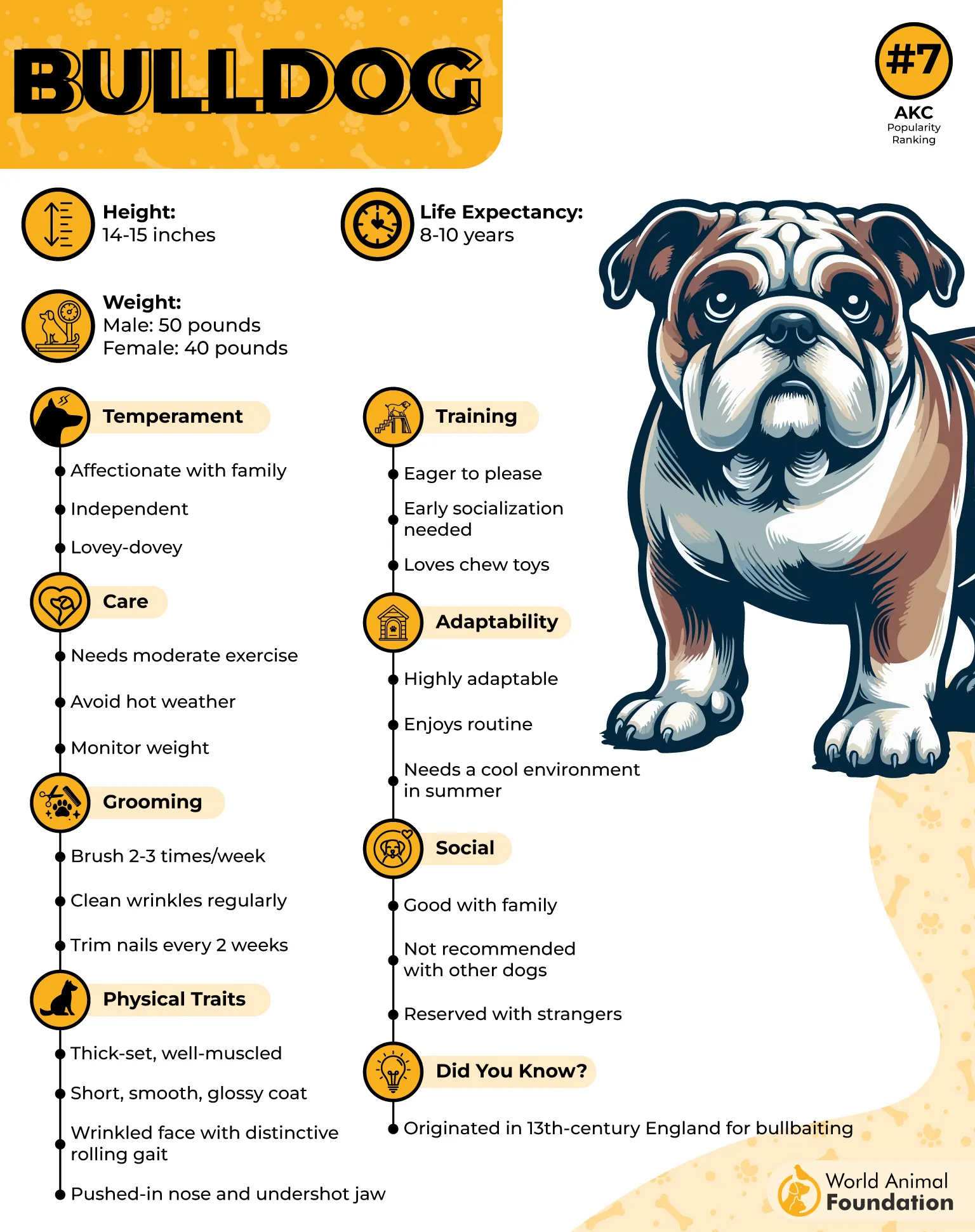
Common Health Problems
According to PetMD, Bulldogs often experience brachycephalic obstructive airway syndrome (BOAS), causing breathing difficulties, especially in warm weather. Skin fold pyoderma and allergies, hip dysplasia, entropion (eyelids rolling inward), and obesity due to low activity levels are also common.
Some of these conditions may require lifelong management or surgical intervention.
Tips to Ensure Good Health
Temperature Care: Provide shade, water, and cool areas; avoid walks during hot hours.
Regular Veterinary Check-ups: Detect and treat issues early.
Balanced Diet: Prevent obesity and maintain overall health.
Skin Care: Clean folds daily to prevent infections.
Pet Insurance: Helps manage potential treatment costs.
3. Pug

Pugs are charming, playful, and affectionate companions, but their distinctive flat faces make them prone to certain health issues. Their brachycephalic structure, short snouts, and compact bodies increase the risk of breathing difficulties, overheating, and obesity.
Being aware of these major concerns helps owners keep their Pug safe, comfortable, and happy.
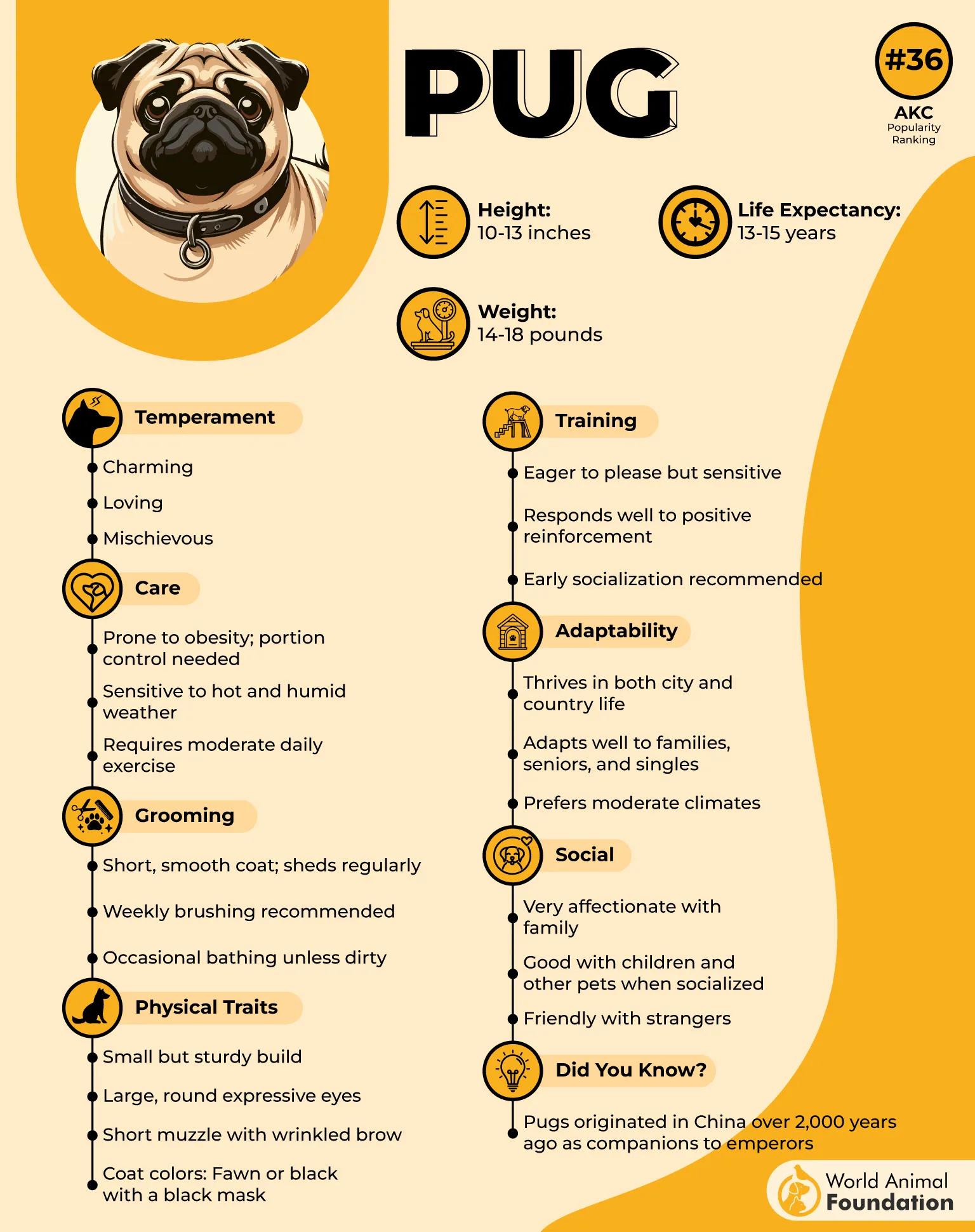
Common Health Problems
Pugs often suffer from brachycephalic airway syndrome, which makes breathing difficult, especially in warm weather. Their small airways increase the effort needed to pant, raising the risk of overheating. Obesity is also common due to low activity levels, which can worsen joint problems and respiratory issues.
Tips to Ensure Good Health
Temperature Management: Avoid outdoor activities during peak heat.
Strenuous Exercise: Limit exertion in hot weather.
Access to Water & Shade: Always provide cool water, shade, and air conditioning.
Weight Control: Maintain a balanced diet to prevent obesity.
Regular Vet Check-ups: Monitor breathing and overall health.
4. German Shepherd
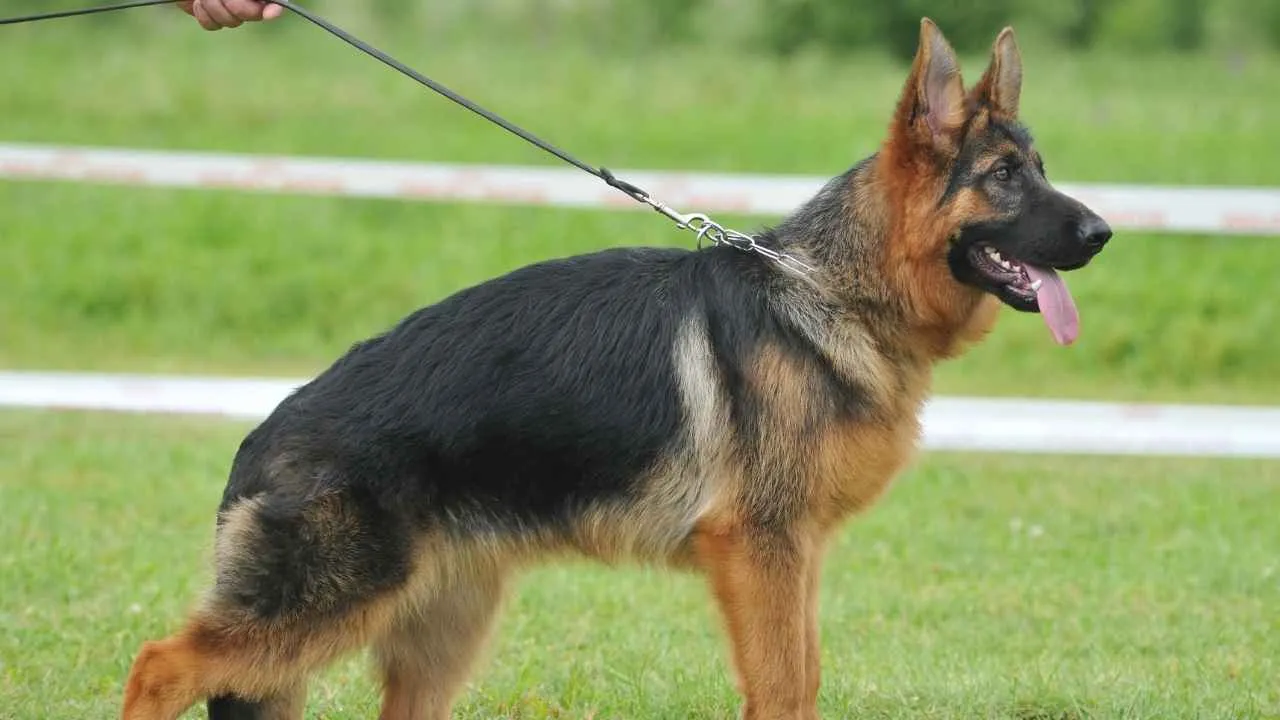
German Shepherds are loyal, intelligent, and versatile companions, but their traits come with health responsibilities. Choosing puppies from screened dog parents can reduce the risk of inherited conditions and give them a healthier start, as per PDSA.
Recognizing early signs helps owners provide timely care and improve their dog’s quality of life.

Common Health Problems
The German Shepherd may face hip and elbow dysplasia, which can lead to pain and mobility problems. Canine degenerative myelopathy can cause back-leg weakness and paralysis.
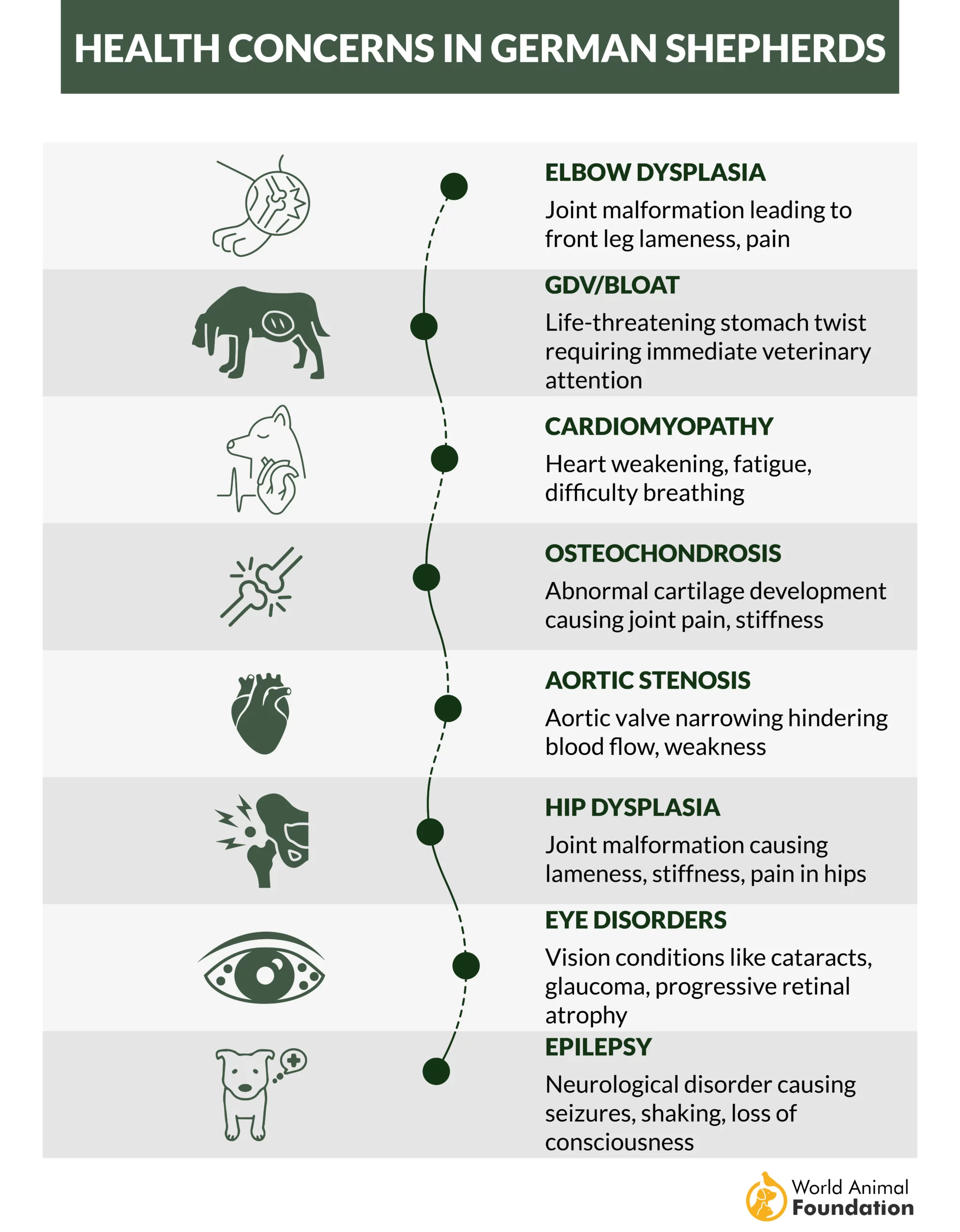
Other concerns include anal furunculosis, inherited eye diseases like cataracts and retinal dysplasia, epilepsy, pituitary dwarfism, and bleeding disorders such as Haemophilia A and B
These conditions often require monitoring, early detection, or lifelong management.
Tips to Ensure Good Health
Health Screened Dog Parents: Ensure breeders conduct hip, elbow, and eye screenings.
Regular Vet Visits: Early detection of issues improves outcomes.
Balanced Diet & Exercise: Support joint health and overall wellness.
Monitor Symptoms: Watch for weakness, limping, or unusual behavior.
Consider Pet Insurance: Helps cover treatment for costly or chronic conditions.
5. Beagle

Beagles are cheerful, inquisitive dogs with a natural charm that wins hearts easily. While they are known for their energy and friendliness, Beagles can face certain health challenges that owners should be aware of. Early awareness and preventive care can make a big difference in their quality of life.
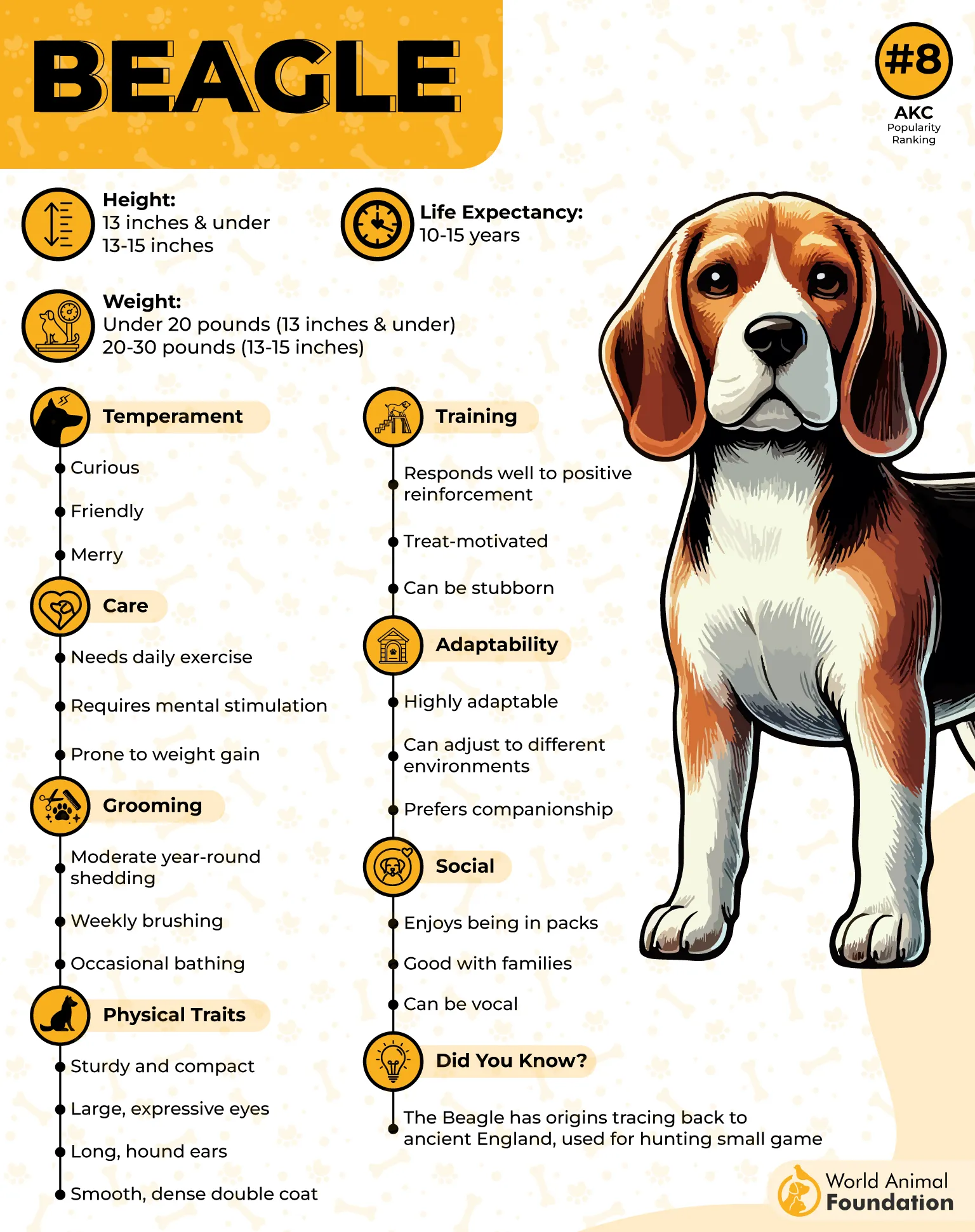
Common Health Problems
Beagles may develop epilepsy, causing seizures, meningitis leading to fever and neck pain, hypothyroidism affecting energy levels, and certain cancers. They are also prone to intervertebral disc disease, eye issues like cherry eye, and ear infections (otitis externa).
Many of these conditions require monitoring, early detection, or veterinary treatment.
Tips to Ensure Good Health
Screened Dog Parents: Buy from breeders who conduct health checks.
Regular Vet Visits: Detect problems early.
Protect the Spine: Avoid high-impact activities to reduce the risk of intervertebral disc disease; support joint health with proper exercise.
Eye Care: Monitor for redness, swelling, or “cherry eye” and consult a vet for early treatment.
Ear Maintenance: Clean ears regularly to prevent infections and check for odor or discharge.
Monitor Symptoms: Watch for seizures, ear infections, or eye problems.
6. Shih Tzu

Shih Tzus are affectionate, charming, and great companions for families or singles alike. Their small size and friendly nature make them ideal lap dogs, but their brachycephalic (short-muzzled) structure brings certain health responsibilities.
Being aware of their predispositions allows owners to provide preventive care and ensure a happy, healthy life.
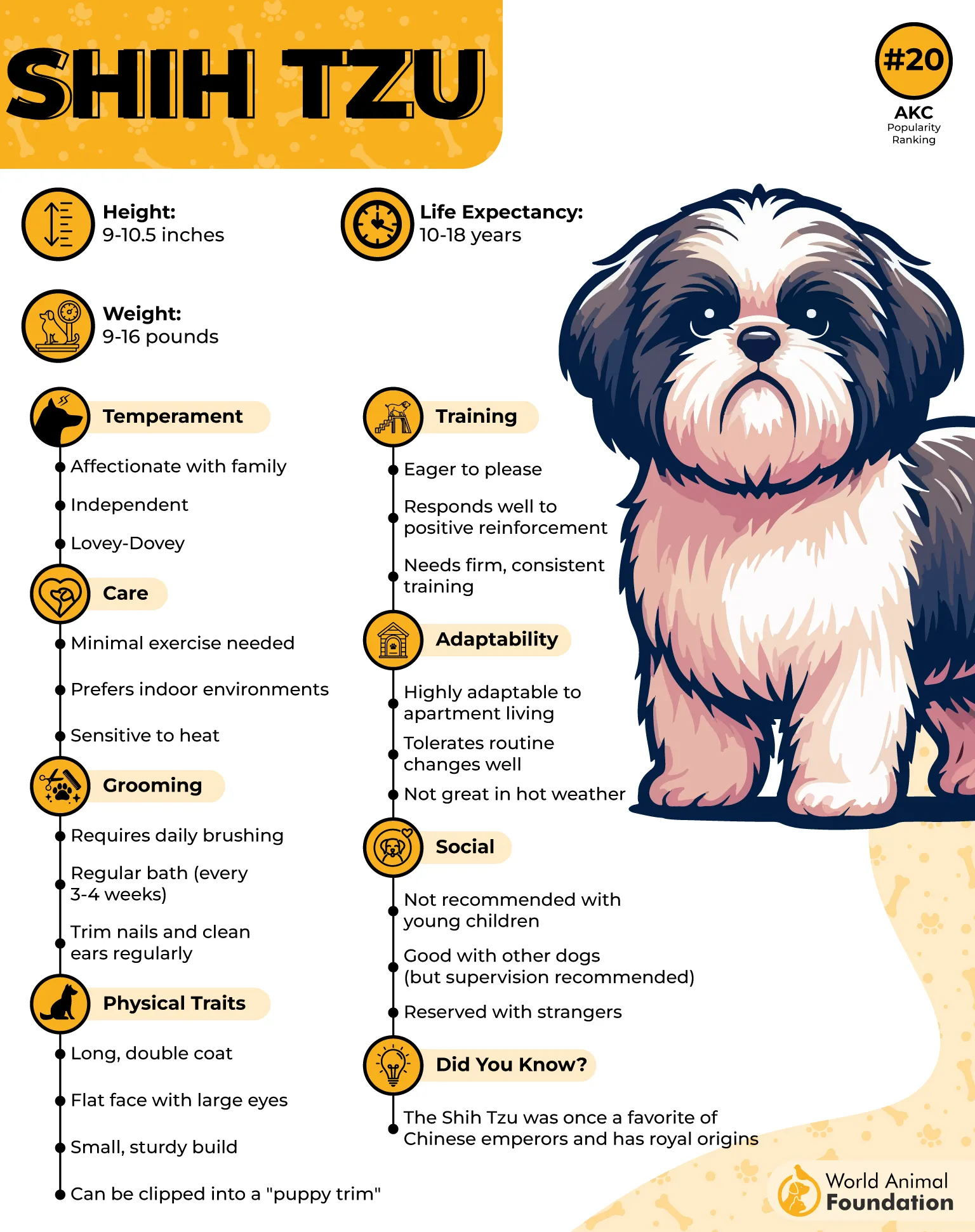
Common Health Problems
Shih Tzus may face brachycephalic syndrome, making them prone to overheating, obesity, and breathing difficulties.
They are also susceptible to luxating patellas, hip dysplasia, various inherited eye conditions such as glaucoma, cataracts, and chronic dry eye, liver shunts (portosystemic shunts), ear infections, and glomerulonephritis. Early detection and veterinary care are key to managing these issues effectively.
Tips to Ensure Good Health
Temperature Care: Keep them cool in hot weather to prevent heatstroke.
Weight Management: limit treats to less than 10% of a dog’s daily calorie intake and ensure your pup gets 20–30 minutes of controlled exercise daily.
Eye & Ear Monitoring: Check regularly for infections or eye abnormalities.
Regular Vet Check-ups: Screen for hip, liver, and kidney issues.
7. Boxer

Boxers are full of personality, combining a spirited energy with a heartwarming affection for their families. Their playful antics and protective instincts make them unforgettable companions, but these traits also come with several health issues.
From heart conditions to joint issues, the Boxer has specific medical needs that deserve attention.
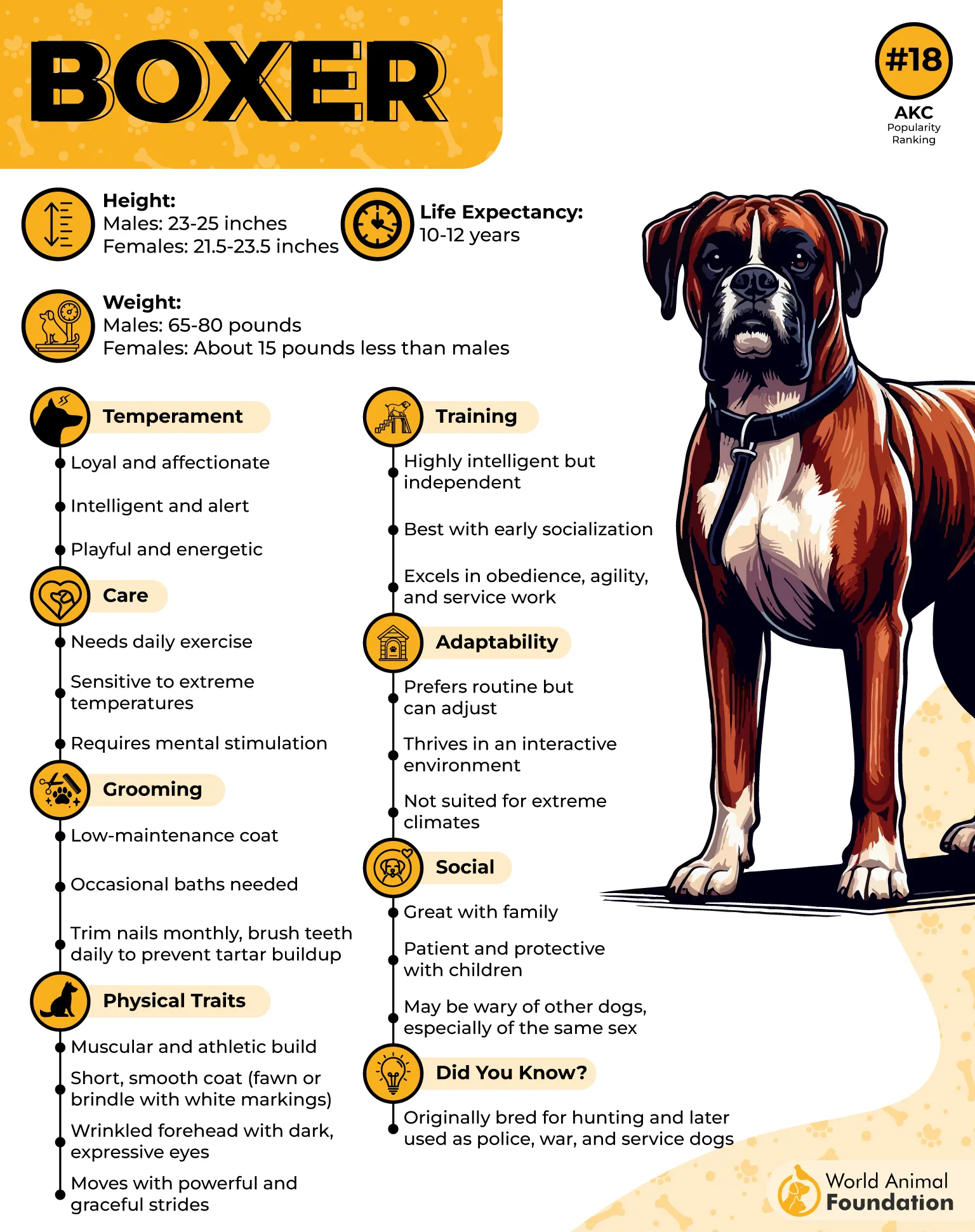
Common Health Problems
Boxers are susceptible to cancer, including lymphoma, heart cancer, and thyroid cancer. Heart conditions such as dilated cardiomyopathy (DCM) and arrhythmogenic right ventricular cardiomyopathy (ARVC) are also common.
Hip dysplasia may affect joint mobility, and some Boxers develop epilepsy, causing seizures. Additionally, they are at risk of bloat (gastric dilatation-volvulus), a life-threatening condition that requires immediate veterinary attention.
Early detection, regular monitoring, and timely veterinary care are essential to manage these health issues effectively.
Tips to Ensure Good Health
Regular Vet Visits: Detect heart, joint, or cancer issues early.
Healthy Diet & Exercise: Maintain an ideal weight and support joint health.
Monitor Symptoms: Watch for seizures, unusual swelling, or breathing difficulties.
Prevent Bloat: Feed smaller meals and avoid vigorous exercise after eating.
Genetic Screening: Test for hereditary conditions to guide breeding and care.
8. Dachshund

With their long bodies and playful personalities, Dachshunds are lively companions that brighten any home. Their unique build, however, makes them susceptible to various health issues and medical problems that responsible owners should understand.
Meeting their specific health needs through preventive care can greatly enhance their quality of life.
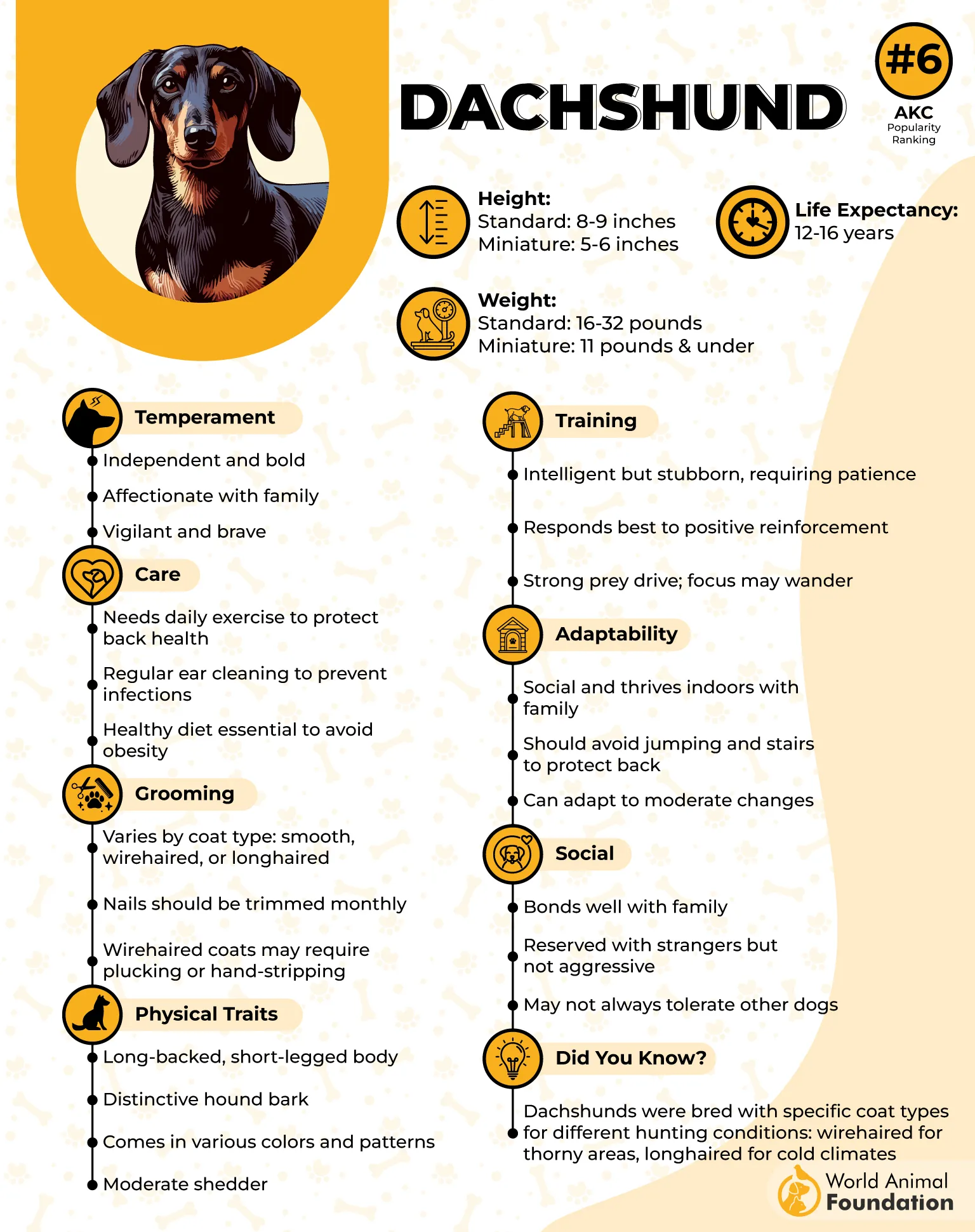
Common Health Problems
Dachshunds often face intervertebral disc disease (IVDD), which can lead to back pain, mobility issues, and paralysis. Their short legs increase the risk of joint problems, including patellar luxation and hip dysplasia.
Obesity can worsen spinal and joint stress. Some may also develop heart or eye issues over time. Timely veterinary care, careful observation, and lifestyle management are essential to keep them healthy and active.
Tips to Ensure Good Health
Weight Management: Maintain a healthy body to reduce spinal strain.
Safe Exercise: Prevent jumping from heights to protect the back.
Vet Check-ups: Regular monitoring for joints, spine, and heart.
Supportive Bedding: Soft areas for rest and comfort.
Symptom Awareness: Watch for back pain, limping, or unusual behavior.
9. Cocker Spaniel

Cocker Spaniels are affectionate, energetic, and social dogs that bring warmth to families. Their long ears and sensitive skin, however, make them prone to certain health conditions. Understanding these risks allows owners to take preventive steps and ensure their dog’s well-being.
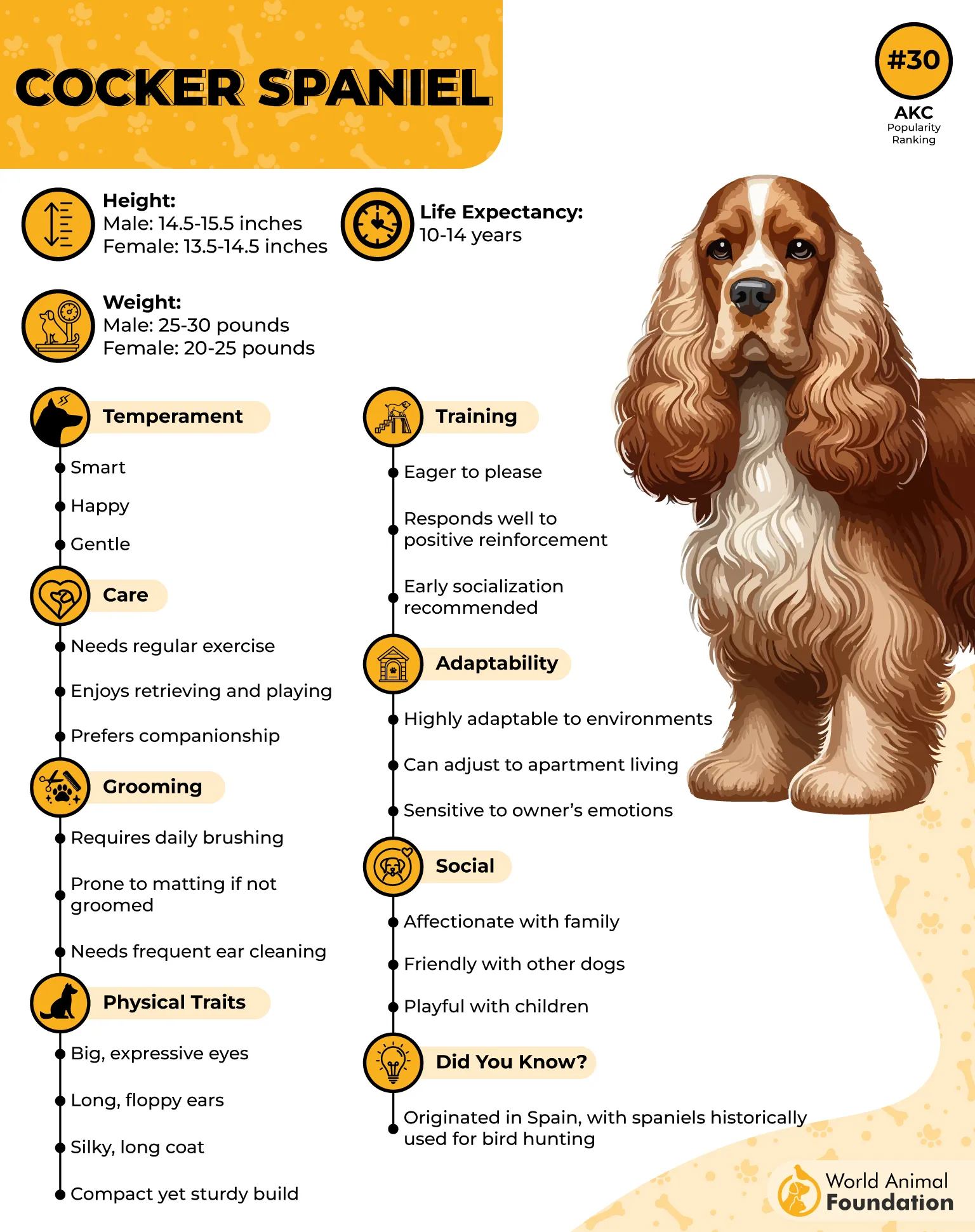
Common Health Problems
Cocker Spaniels frequently develop ear infections due to floppy ears and eye issues like cataracts or glaucoma. Hip dysplasia and heart problems may occur as they age, and skin problems such as allergies or seborrhea are common.
Obesity can worsen joint and heart concerns, while some may experience autoimmune or liver-related disorders. Early detection and consistent veterinary care are vital to maintaining their health.
Tips to Ensure Good Health
Ear Care: Keep ears clean and dry to avoid infections.
Eye Monitoring: Check regularly for cloudiness or irritation.
Balanced Diet & Exercise: Maintain weight and support joints.
Vet Visits: Screen for heart, liver, and joint conditions.
Skin Maintenance: Groom regularly and inspect for skin issues, rash, or irritation.
Conclusion
Understanding which dog breeds are more prone to health issues helps owners make informed choices and provide the best care possible.
While no dog is completely a healthy dog breed, being aware of potential risks, choosing responsibly bred puppies, and maintaining regular veterinary care can greatly improve their quality of life.
With attention, love, and preventive care, even breeds with higher health risks can enjoy long, happy, and fulfilling lives as cherished family members.
Test Your Knowledge: Unhealthy Dog Breeds
🐺 Which energetic dog is prone to hip dysplasia and eye problems?
🫁 Which wrinkled breed often struggles with breathing and heat?
🌞 Which small, playful dog needs temperature management due to brachycephalic risks?
🦴 Which long-backed breed is prone to intervertebral disc disease?
❤️ Which affectionate breed often faces heart problems, cancer, and hip dysplasia?


